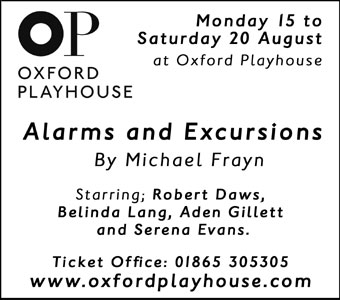August 15, 2011
The genius of Michael Frayn is back at the Playhouse with this charming collection of eight tales of dysfunction, in which marital discord, mechanical failures and plain old mishearings abound. An energetic cast of four (Belinda Lang, Aden Gillett, Serena Evans and Robert Daws) take on something like 25 roles and grapple with the exigencies of the everyday, from obstreperous corkscrews via jovial husbands to nocturnal bloodsucking.
There's a strong element of farce - Frayn is after all the consummate author of Noises Off - particularly in the first playlet, Alarms. People dash in and out, up and down stairs, and telephones, burglar alarms, cooker timers and a small cheeping noise play as much of a part as the humans.
Alarms is one of the two longer playlets in the first half. In each of these sketches we get to know a pair of couples; their foibles, and an intimate portrait of how their relationships tick. Doubles is a little sadder, a little more set in its ways, the relationships requiring more tolerance. But even the annoyingly jocular Miles and stiff wife Melanie are likeable characters. The quartet of actors pull off a miraculously sympathetic portrayal of all the misfits, even as the crises grow.
In the second half the sections are shorter, some barely more than sketches. This ups the pace, but does take rather smaller bites at each character; though we get a welcome return to the cast of Alarms, now back from casualty... Fortunately Frayn gives us good punchlines to the skits, and Finishing Touches got real belly laughs.
Belinda Lang stands out as the most versatile actor of the four, fitting herself most snugly into the unique twists of each character. For most of the sketches the pairings went the same way. I don't know whether Frayn dictates this, but I wondered if more swapping about would have given a different chemistry to some of the scenes.
The lighting is excellent, lending clarity to the confusion, and the set design has to be entirely portable, recycling all the props from one quick change to another. It's always fun to see the big-budget professional productions with swish sets, but I'd love to see itdone with no props at all, except perhaps a telephone - no distractions from the sound effects!
All in all, the chopping and changing makes for the inverse of an Ayckbourn play - no single big scenario to set up, but a series of very satisfying payoffs. A riot of colour and chuckling to live on in the mind, and just enough of those wry observations to recognise in yourself. "The man came about the thing, darling... "
There's a strong element of farce - Frayn is after all the consummate author of Noises Off - particularly in the first playlet, Alarms. People dash in and out, up and down stairs, and telephones, burglar alarms, cooker timers and a small cheeping noise play as much of a part as the humans.
Alarms is one of the two longer playlets in the first half. In each of these sketches we get to know a pair of couples; their foibles, and an intimate portrait of how their relationships tick. Doubles is a little sadder, a little more set in its ways, the relationships requiring more tolerance. But even the annoyingly jocular Miles and stiff wife Melanie are likeable characters. The quartet of actors pull off a miraculously sympathetic portrayal of all the misfits, even as the crises grow.
In the second half the sections are shorter, some barely more than sketches. This ups the pace, but does take rather smaller bites at each character; though we get a welcome return to the cast of Alarms, now back from casualty... Fortunately Frayn gives us good punchlines to the skits, and Finishing Touches got real belly laughs.
Belinda Lang stands out as the most versatile actor of the four, fitting herself most snugly into the unique twists of each character. For most of the sketches the pairings went the same way. I don't know whether Frayn dictates this, but I wondered if more swapping about would have given a different chemistry to some of the scenes.
The lighting is excellent, lending clarity to the confusion, and the set design has to be entirely portable, recycling all the props from one quick change to another. It's always fun to see the big-budget professional productions with swish sets, but I'd love to see itdone with no props at all, except perhaps a telephone - no distractions from the sound effects!
All in all, the chopping and changing makes for the inverse of an Ayckbourn play - no single big scenario to set up, but a series of very satisfying payoffs. A riot of colour and chuckling to live on in the mind, and just enough of those wry observations to recognise in yourself. "The man came about the thing, darling... "





